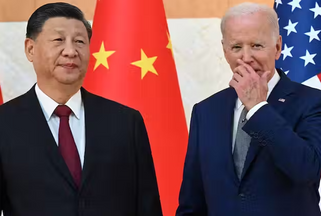Posted by BW Actual on Nov 15th 2023
BLACKWATER USA | DAILY BRIEF
Gaza
- Israeli troops entered Gaza's Al Shifa hospital in full force for a "precise and targeted operation" against the Hamas command structure Israel believes is hidden under the facility.
- Perhaps at U.S. urging, Israel will soon allow some trucks serving the UN refugee agency in Gaza - UNRWA - to refuel at the Rafah border crossing. It would be the first time Israel has allowed significant fuel imports into Gaza: it had been blocking imports to prevent Hamas from siphoning fuel for military purposes, and some Gazan drivers are reportedly resorting to running their cars on cooking oil.
- Ukraine's military captured land on the east side of the Dnieper River that could become its entry point for a new attack path toward Russian-occupied Crimea.
- Separately, Ukrainian prosecutors accused an ex-prosecutor and two legislators - one current and one former - of treason for spying for Russia.
- The U.S. extended a sanctions waiver allowing Iraq to buy power from Iran - and Iran to use the proceeds to import humanitarian goods. The extension will add 120 more days to the waiver, and it serves as a sign that U.S.-Iran tensions are relatively stable and not drastically worsening, despite Hamas's war in Gaza.
- An NYT explainer pasted below lays out Pres. Biden and Xi's objectives for their meeting today: both want to "derisk" the relationship between their countries, and Xi wants to woo American companies to China.
- Mali's junta leader said his military seized Kidal, a Tuareg rebel stronghold in the north of the country. The tough Tuaregs had controlled it for almost 10 years: they want to carve out an independent state they call Azawad.
President Biden and his Chinese counterpart, Xi Jinping, are set to meet on Wednesday, as the two seek to maintain ties despite trade tensions.
Trying to set a floor under U.S.-China relations
Nine months after the Chinese spy balloon controversy sent relations between Washington and Beijing to a new low, President Biden and the Chinese leader, Xi Jinping, will meet this week in San Francisco for face-to-face talks.
The summit won’t end the standoff between the world’s biggest economies. But it’s a sign that Biden and Xi want to maintain ties, despite trade tensions, tit-for-tat sanctions and questions about the future of Taiwan — and business leaders will be hoping for some sign of a thaw.
Talk is about derisking, not decoupling. Officials have been at pains to emphasize that the U.S. and China are competitors rather than zero-sum rivals. “We have a $700 billion trading relationship with China. The vast majority — 99 percent of that — has nothing to do with export controls,” Gina Raimondo, the commerce secretary, told CNN this weekend. Jake Sullivan, the national security adviser, has called the countries “economically interdependent” and Janet Yellen, the Treasury secretary, has warned that economic separation “would have significant global repercussions.”
Xi told a visiting U.S. congressional delegation last month that there were “a thousand reasons to make U.S.-China relations better, and no reason to make them worse.”
Can they find common ground? The U.S. hopes to resume military communications that were broken off after Representative Nancy Pelosi visited Taiwan last year. Biden may reassert American support for the “one China” policy that recognizes Beijing as the sole government of China, while warning Xi against interfering in Taiwan’s presidential election next year. And the U.S. will hope for cooperation on tackling climate change and fentanyl trafficking (China is a big source of the drug used in opioid production).
Where does this leave business? Xi will hold a banquet with U.S. executives after the summit, an effort to show that his country is open to foreign businesses.
Many Western companies say it is becoming increasingly difficult to operate in China. But some of Wall Street’s top bosses attended a financial industry summit in Hong Kong last week, suggesting that they aren’t about to leave. Still, there was little talk about the challenge of doing business in China, and in a sign of the sensitivity, reporters weren’t even allowed in the room to ask questions.
But that might not matter for Xi. Images of the Chinese leader breaking bread with American C.E.O.s may be valuable enough for his audience at home.

